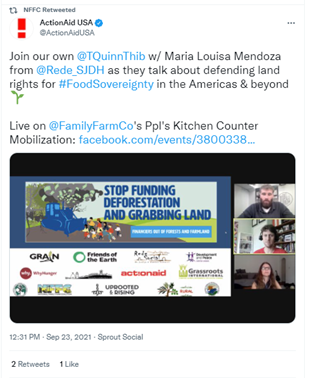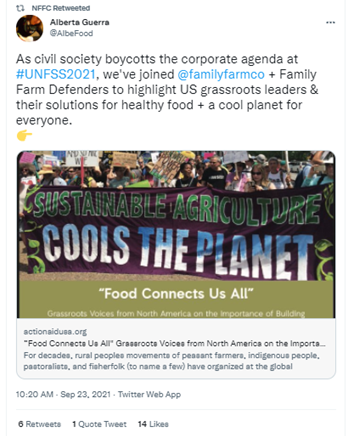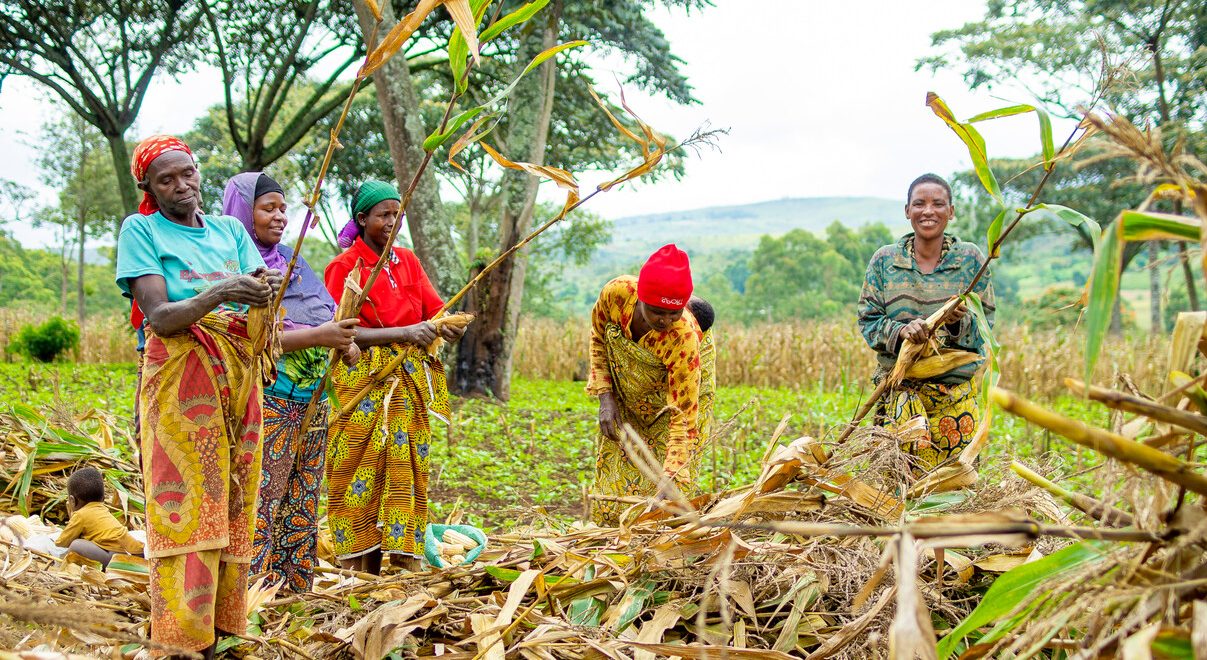As we prepare for World Food Day this Saturday, October 16th, the need to transform the food system is becoming increasingly apparent. The dominant model of large-scale, chemical-intensive, corporate-controlled agriculture is a root cause of the worsening climate crisis through its unsustainable practices; is making hunger, poverty, and inequality worse through pushing small-scale farmers out; and contributes to the dangers and impacts of pandemics like COVID-19 through factory-farmed, intensive livestock agriculture and exploitative labor practices.
Peoples’ Kitchen Counter Mobilization Take Back
That is why ActionAid USA joined hundreds of organizations that boycotted the UN Food Systems Summit. The Summit was initially met with excitement by many organizations working to end hunger and encourage sustainable agriculture because it indicated that the UN was addressing the “food system” in a systemic way and preparing to address the root causes of hunger and climate crisis. However, the Summit was quickly given over to corporate interests who controlled the agenda from behind the scenes.
So instead, we joined other North American human rights organizations, farmers and fishers’ movements, and Indigenous Peoples in the Peoples’ Kitchen Counter Mobilization Take Back to highlight the ways that communities are raising their visions and fighting for a world based in human rights.
This event was led by the National Family Farm Coalition and gave us a platform to speak to hundreds of people directly and thousands on social media about our work to fight against corporate land grabs and for land rights.

Food Connects Us All
Using this event as a platform, we also launched our new publication for organizers, “Food Connects Us All,” to help more North Americans understand how to get involved in global policy fights and strengthen their work in their own community. We need many more people and many more organizations pushing back against the false solutions, false promises, and false processes that agribusiness is selling to people to appear more sustainable. Instead, we collectively need to promote food systems based on agroecology, a society based on human rights and dignity, and political processes that are truly democratic and center and prioritize the voices and needs of people.

Bigger is Not Better: The High Cost of Agribusiness
We also launched another new publication “Bigger is Not Better: The High Cost of Agribusiness” about the many impacts that corporate consolidation and concentration in agriculture have had on our food, our communities, our environment, and our politics. We launched the report in an online event on Sept 28 with farmer, worker, and researcher allies to highlight how attempts to reform industrial agriculture to make it more sustainable without also dismantling corporate power would not work and how a movement of farmers, workers, and communities must be at the forefront of making the changes we need in our food system.
From Disparity to Parity
We launched new videos: “Disparity to Parity: Stop Overproduction to Stop Climate Change” and ”Disparity to Parity: Taking the Climate Agenda Back from Corporations” produced in partnership with farmers from the National Family Farm Coalition to show why climate action in agriculture requires not only breaking up agribusiness monopolies but also ensuring that farmers are paid fairly for their crops, workers are paid fairly for their labor, and that all people have access to land to produce healthy food.
TIAA: “Net Zero” is NOT Zero!
We led a letter signed by 113 organizations to the financial corporation TIAA, calling the company’s pledge to achieve “net-zero” emissions by 2050 a dangerous distraction and denouncing its plan to offset its carbon emissions through tree plantations (instead of divesting from fossil fuels) as greenwashing and a false solution. Instead of TIAA’s plan to dramatically increase its carbon offsets, which would require TIAA to acquire millions more acres of land and would almost assuredly contribute to land grabbing, the letter demands that TIAA immediately stop its land deals and divest from fossil fuel companies and fossil fuel projects by 2025. Climate scientists have stated that global carbon emissions need to be cut by 45% by 2030 if humans are to keep global warming from going beyond 1.5 degrees, but TIAA’s plans are too little too late.
Challenging the Biden Administration to do More
These corporate false solutions are so prevalent because our governments are not doing enough to stop these crises.
Instead of taking bold action in line with what people want, our governments side with corporations who want to maintain “business as usual.” So for World Food Day 2021, ActionAid has joined 60 organizations in writing a letter to the Biden Administration demanding that the US government completely revamp its approach to global food and agriculture policy-making. The U.S. must move away from supporting agriculture that is dominated by multinational corporations and focused on industrial technologies and the production of commodities for export to the global market. Instead, we demand that the US government support food systems that are based in the science, practice, and movement of agroecology. We also demand that the US government recognize the human right to food, giving special priority to the voices, needs, and solutions of the people to whom the right to food means life or death.
We are entering the fight of our lives for our food systems and for our ecosystems. ActionAid is doing its part, and we thank you for doing yours.

